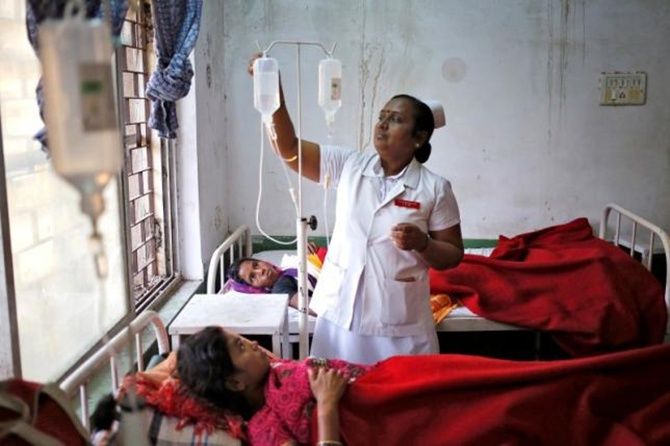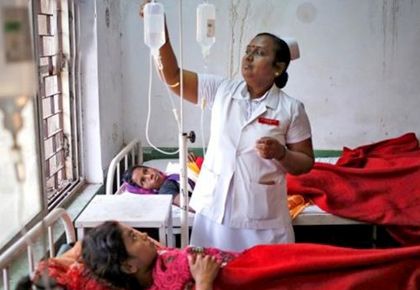If you have fever over 105 degree Fahrenheit, experience sweating and fatigue, it could be signs of malaria, warns Dr Ajay Aggarwal.

World Malaria Day, observed April 25 aims to raise awareness and find solutions to prevent the deadly disease from taking more lives.
According to the World Health Organisation's World Malaria Report 2018, no significant gains were made in reducing malaria cases between 2015 and 2017.
The estimated number of malaria deaths in 2017, at 4,35,000, remained virtually unchanged over the previous year.
With about 9.5 million malaria cases reported in 2017, down 3 million cases since 2016, India is no longer among the top three countries with the highest malaria burden.
India has managed to reduce its disease burden, registering a 24 per cent decrease between 2016 and 2017, according to the World Malaria Report 2018. 1.25 billion Indians -- 94 per cent of India’s population are still at risk of malaria (the report states).
India which currently accounts for 4 per cent of the global malaria cases, has set 2030 as the target year for eliminating malaria.
Dr Ajay Aggarwal, additional director, internal medicine, Fortis Noida share some essential steps to recognise the early symptoms and ways to tackle malaria.
What causes malaria?
Malaria is caused due to Plasmodium parasites which are carried by the female Anopheles mosquito.
Out of five, two species of the parasite, P. falciparum and P. vivax, pose the greatest threat to human beings.
Once the mosquito bites the person, the parasite enters the liver infecting the red blood cells.
These begin to grow and reproduce in red blood cells until they swell and burst, releasing new parasites that infect more red blood cells.
Once the parasites have infected the blood, the symptoms of malaria begin to appear.
Early symptoms
- High fever (up to 105 degrees Fahrenheit) with shaking chills
- Profuse sweating when the fever suddenly drops
- Fatigue
- Headache
- Muscle aches
- Abdominal discomfort
- Nausea, vomiting
- Feeling faint while standing or sitting up quickly
- Confusion, drowsiness, seizure, coma
- Low blood sugar
- Jaundice
- Decreased urine or Coca Cola coloured urine
Diagnosis
By conducting a blood test, you can affirm the following details, which will help detect the condition and look for treatment accordingly.
- Levels of red blood cells
- Platelets
- Ability of your blood to clot
- Blood chemistry
- Liver function
- Kidney function
Who is at risk?
- Infants (children under 5 years of age)
- Pregnant women
- Patients with HIV/AIDS
- Non-immune migrants
- Mobile populations
- Populations who reside in tropical humid environments
- People who reside in unhygienic conditions i.e. near stale dirty water bodies
Home remedies and prevention
- Use of mosquito coils
- Mosquito repellents sprayed on skin
- Screening windows and doors
- Mosquito proof bed nets
- Closed windows during late evenings and early mornings
- Wearing protective clothing, such as long sleeve shirts
- Avoiding dark coloured clothes
- Using insecticide-treated mosquito nets
- Indoor residual spraying
- Removal of all sources of stagnant water
- Use of Malaria Vaccine, if the disease is contracted
Malaria is a public health problem in several parts of the country.
About 95 per cent population in the country resides in malaria endemic areas and 80 per cent malaria cases reported in the country are confined to tribal, hilly, difficult and inaccessible areas.
The Directorate of National Vector Borne Disease Control Programme (NVBDCP) under the Ministry of Health has framed technical guidelines/ policies to prevent the spread of the disease.
Indicators have been developed at national level for monitoring of the programme so that there is uniformity in collection, compilation and onward submissions of data which would be helpful in combating malaria at a larger level.
Health authorities have devised mosquito control measures that include interventions and timely behaviour changes.
Indoor insecticide spraying, reduction of mosquito breeding spots and free distribution of long-lasting insecticidal nets (LLINs) were some of the measures initiated.
LLINs, installed around beds, also kill the mosquitoes on contact and are considered a critical malaria-control intervention.
On an individual level, the best way to protect yourself from the disease is by keeping the surroundings clean and watching out for mosquito breeding areas.
If you spot any of the signs, go for a blood test and consult a doctor to be sure.
Timely diagnosis and medication will help you stay healthy and fight malaria.
 *Image published for representational purposes only.
*Image published for representational purposes only.










